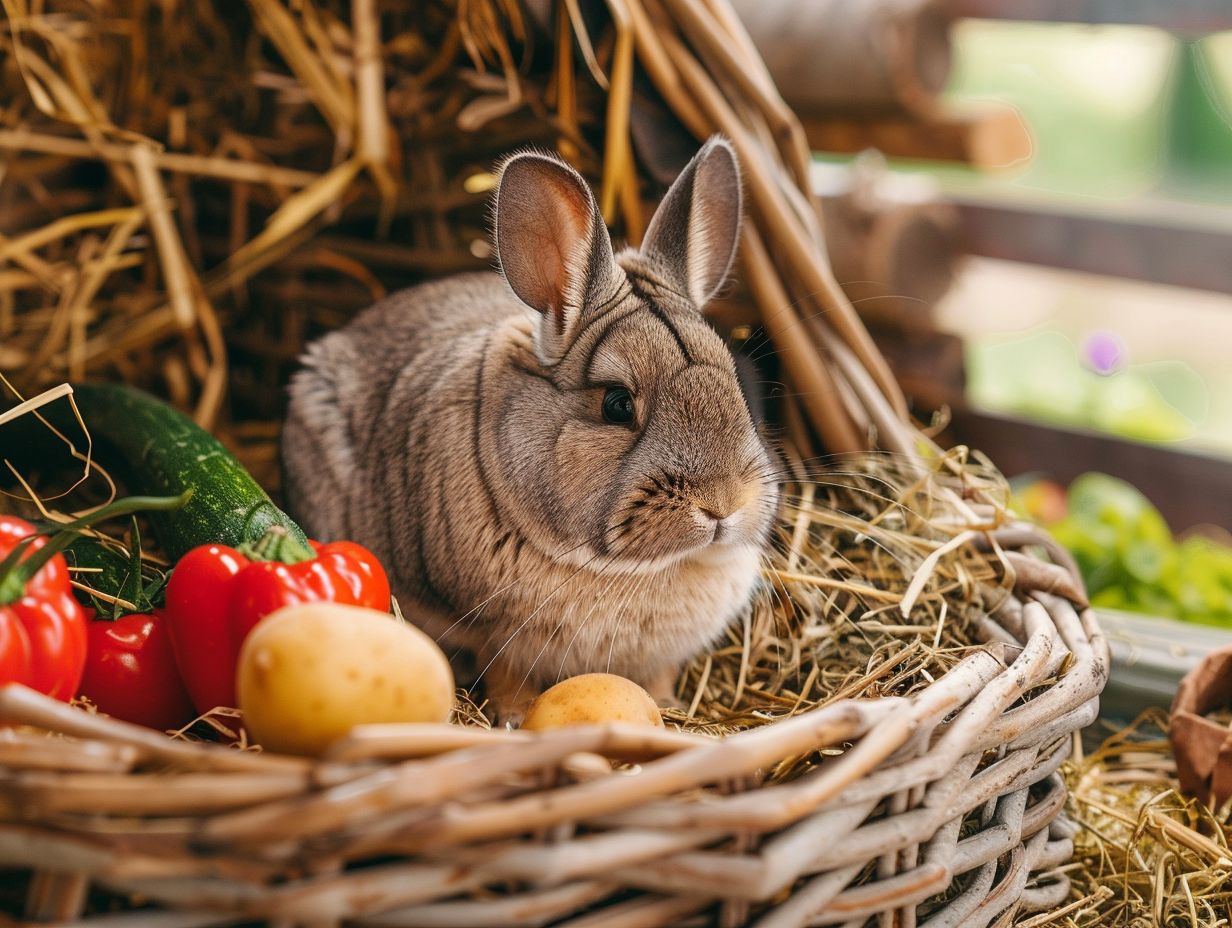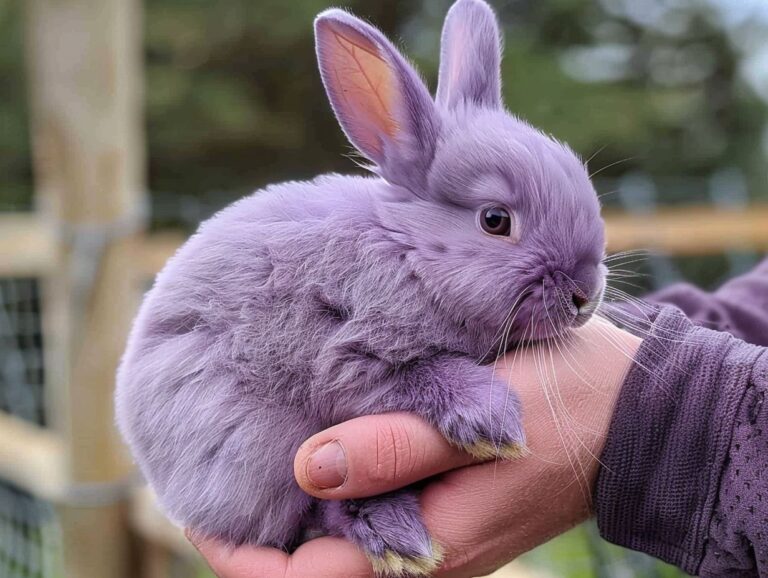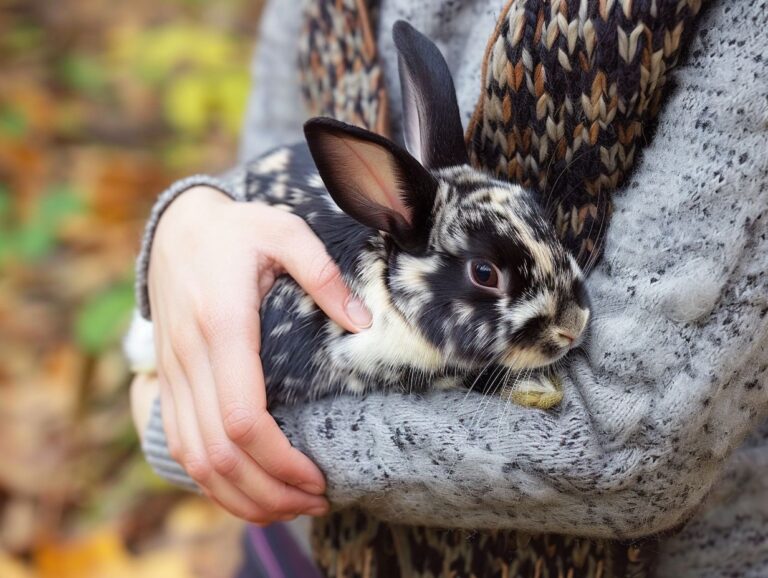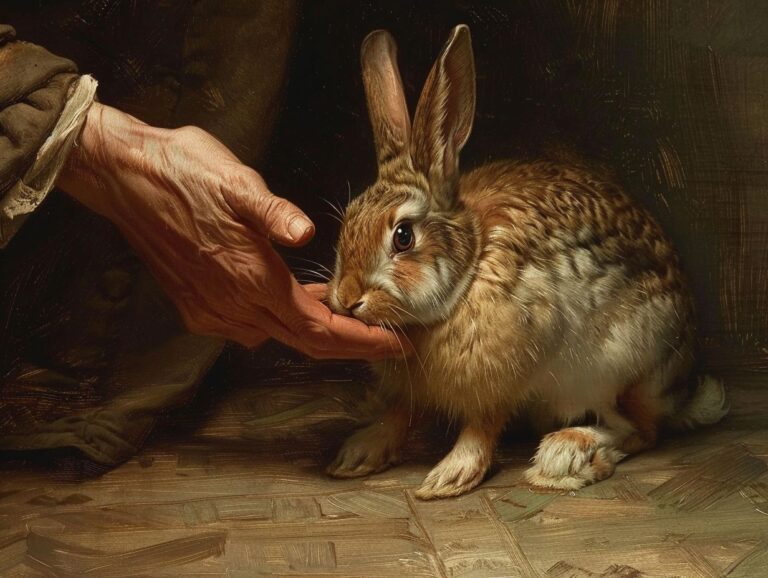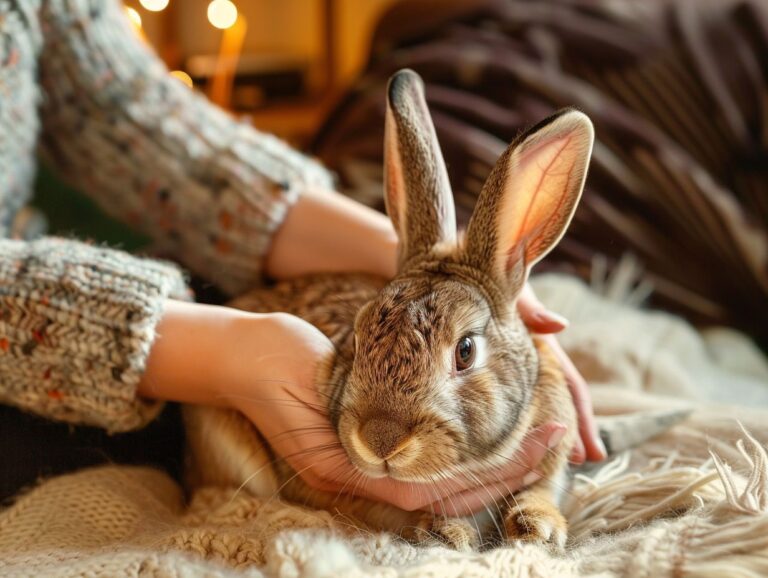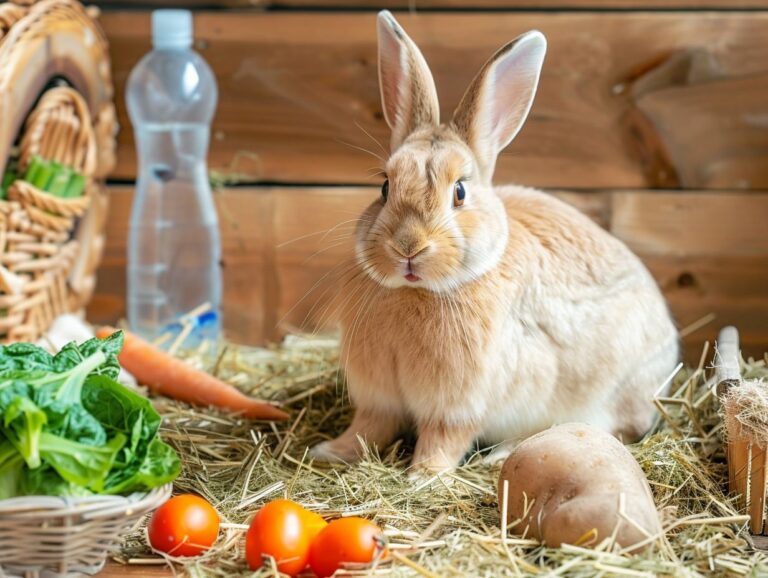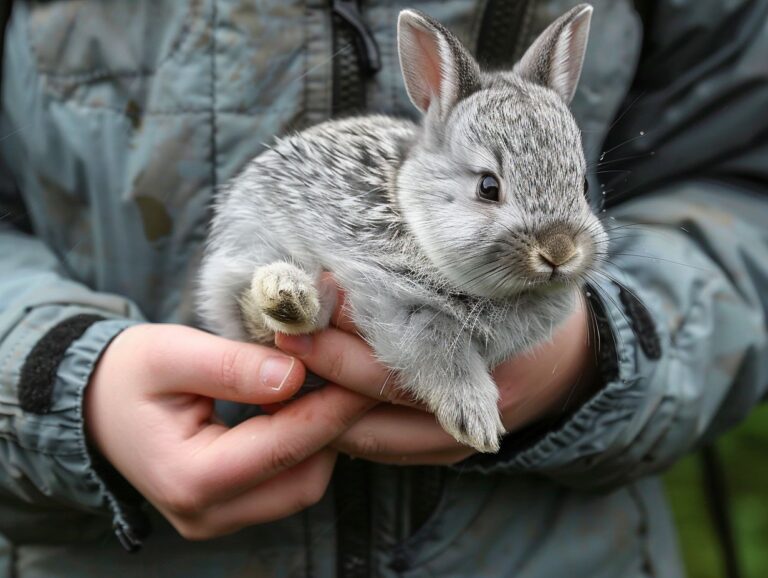Standard Chinchilla Rabbits As Pets: Care, Diet, and Health For Medium Sized Breeds
Are you considering getting a standard Chinchilla rabbit as a pet? These medium-sized rabbit breeds come with their own set of care, diet, and health considerations that you should be aware of.
In this article, we will explore the characteristics of medium-sized rabbit breeds, the benefits of owning a standard Chinchilla rabbit, their basic needs, common health issues, bonding tips, fun activities, and important considerations before bringing one home.
Let’s dive in and learn everything you need to know about these adorable furry companions!
Key Takeaways:
What Are Standard Chinchilla Rabbits?
Standard Chinchilla Rabbits are a recognized breed known for their distinctive fur coloration and docile temperament.
Originally developed in France in the early 20th century, Standard Chinchilla Rabbits were recognized by the American Rabbit Breeders Association in 1924 as a distinct breed. Their fur is characterized by a pearly gray undercolor with black ticking, creating a striking silver-tipped effect. These rabbits are known for their gentle and friendly nature, making them ideal as pets or for show purposes. They have a medium-sized body with a commercial-type physique and distinctive russet eyes. Standard Chinchilla Rabbits are listed as ‘watch’ by the American Livestock Breeds Conservancy, signifying their status as a rare heritage breed.
What Are the Characteristics of Medium Sized Rabbit Breeds?
Medium Sized Rabbit Breeds exhibit a range of sizes, colors, behaviors, and characteristics that make them popular choices among pet owners. These rabbits offer a diverse selection for those looking to bring a rabbit into their home.
One of the appealing aspects of medium-sized rabbit breeds is their variation in coat types, ranging from short and sleek to long and fluffy. This diversity not only influences their appearance but also impacts grooming requirements. While some breeds may need regular brushing to prevent matting and shedding, others may have self-cleaning coats that require minimal maintenance.
- These rabbits display unique behaviors that can range from being active and playful to more docile and calm. Understanding the specific traits of each breed is essential for providing appropriate care and enrichment.
- Regarding health considerations, medium-sized rabbits are generally robust and resilient, but preventive measures such as a balanced diet and regular vet check-ups are crucial for their well-being.
- Some popular medium-sized rabbit breeds include the Dutch rabbit, known for its distinctive markings, the Havana rabbit with its stunning chocolate-colored coat, and the Satin rabbit prized for its silky fur.
What Are the Average Weight and Size of Medium Sized Rabbit Breeds?
Medium Sized Rabbit Breeds typically range in weight from 6 to 9 pounds, with variations based on the specific breed and individual rabbit. Their size falls within the mid-range spectrum, making them manageable for both indoor and outdoor habitats.
These medium-sized rabbits usually measure around 16-20 inches in length and stand about 10-14 inches tall. Some popular breeds in this category include the Mini Rex, Dutch, and Florida White. Despite their compact size, these rabbits are known for their energetic and curious nature, requiring regular exercise and mental stimulation. If you are considering American Sable rabbits as pets, understanding their care, diet, and health for medium-sized breeds is essential.
Regarding diet, a balanced mix of hay, fresh vegetables, pellets, and occasional treats is essential for their well-being. Providing them with appropriate toys and playthings can help prevent boredom and keep them mentally engaged.
What Are the Common Colors of Medium Sized Rabbit Breeds?
Medium-Sized Rabbit Breeds come in a variety of common colors such as grey, white, brown, and black.
Their coats are not only limited to solid colors; you might find rabbits with striking patterns like agouti, broken, or harlequin. Some rabbits boast tri-color combinations that create a distinctive and eye-catching appearance. The textures of their fur can vary from plush, velvety to sleek and shiny, adding an element of uniqueness. When breeding medium-sized rabbit breeds, breeders often aim to enhance these visually appealing characteristics through selective pairings, resulting in offspring that inherit these stunning coat variations.
What Are the Benefits of Owning a Standard Chinchilla Rabbit as a Pet?

Owning a Standard Chinchilla Rabbit as a pet can bring numerous benefits, including their gentle and affectionate personality, manageable care requirements, and a lifespan that allows for long-term companionship.
Standard Chinchilla Rabbits are known for their friendly nature, making them ideal companions for families, individuals, and even seniors. Their sociable temperament enables them to form strong bonds with their owners, often seeking affection and interaction. These rabbits are relatively easy to care for, with straightforward dietary needs that primarily consist of high-quality hay, fresh vegetables, and a constant supply of clean water.
Average life expectancy for a Standard Chinchilla Rabbit ranges from 8 to 12 years, ensuring years of joy and companionship. Regular veterinary check-ups, a spacious cage or enclosure, and mental stimulation through toys and training activities can contribute to their overall health and well-being.
What Are the Basic Needs of Standard Chinchilla Rabbits?
Standard Chinchilla Rabbits have specific basic needs that include suitable housing arrangements, a balanced diet, and regular grooming to maintain their health and well-being.
Regarding housing, indoor cages or hutches with ample space for exercise and movement are essential for these rabbits. Providing them with a comfortable and safe environment is crucial for their well-being. As for their diet, a nutritionally complete food mix of hay, pellets, and fresh vegetables is necessary to ensure they receive all the essential nutrients. Regularly checking their teeth and grooming them to prevent matting and maintain a clean coat are integral parts of their care routine.
What Type of Housing is Suitable for Standard Chinchilla Rabbits?
Selecting suitable housing for Standard Chinchilla Rabbits is crucial, with options ranging from indoor cages to outdoor hutches. Providing a safe and comfortable living environment is essential for their well-being.
Indoor cages offer a controlled environment and protection from the elements, making them ideal for households with limited outdoor space. On the other hand, outdoor hutches provide a more natural setting, allowing rabbits to graze and explore.
- When setting up the living space, consider adding toys such as tunnels, chew toys, and platforms to stimulate their active temperament.
- Make sure the housing is draft-free, well-ventilated, and spacious enough for the rabbit to hop around comfortably.
- Regularly clean and sanitize the living area to prevent health issues and ensure a hygienic environment.
The key is to create a space that promotes both physical activity and mental well-being for your furry companion.
What Kind of Diet Should Standard Chinchilla Rabbits Have?
Standard Chinchilla Rabbits should be fed a diet rich in hay, fresh vegetables, and high-quality pellets to ensure their nutritional needs are met. A balanced diet is essential for their overall health and well-being.
Hay is a crucial component of a Standard Chinchilla Rabbit’s diet, providing essential fiber for proper digestion and dental health. Vegetables add variety and important vitamins to their diet, while high-quality pellets serve as a concentrated source of essential nutrients. Check out this resource for care tips for small breed rabbits.
It is advisable to consult a vet specialized in rabbit care to create a personalized diet plan, taking into account the individual needs and preferences of your furry companion.
How Often Should Standard Chinchilla Rabbits Be Groomed?
Regular grooming is essential for Standard Chinchilla Rabbits to maintain a healthy coat and overall hygiene. Brushing their fur and checking their teeth should be part of a routine grooming schedule to prevent health issues.
Chinchilla Rabbits are known for their serene behavior, often enjoying gentle grooming sessions that can also strengthen the bond between the rabbit and its owner. Beyond aesthetics, grooming plays a critical role in preventing matting and reducing the risk of skin infections. A veterinarian visit can help in identifying any underlying health concerns that may manifest through changes in grooming habits. Providing a balanced diet high in fiber is also crucial for their dental health, as it helps wear down their teeth naturally while reducing the chances of overgrowth.
What Are Some Common Health Issues for Medium Sized Rabbit Breeds?

Regarding gastrointestinal problems, rabbits are particularly sensitive due to their delicate digestive systems. Issues like gastrointestinal stasis can quickly escalate, causing discomfort and potentially life-threatening conditions. Owners need to monitor their rabbit’s eating habits and stool consistency closely to catch any irregularities early on.
Dental health is another significant concern for medium-sized rabbits. Their teeth continuously grow, and if they don’t wear down properly, it can lead to malocclusion and related problems. Providing appropriate chew toys and a balanced diet high in hay can help maintain their Rhinelander rabbits as pets dental health.
Behavioral changes can often be the first indicators of underlying illnesses in rabbits. Signs like lethargy, reduced grooming, or changes in appetite should not be overlooked. Understanding your rabbit’s normal behavior and seeking prompt veterinary attention when these changes occur can make a significant difference in their care.
What Are the Signs of Illness in Standard Chinchilla Rabbits?
Identifying signs of illness in Standard Chinchilla Rabbits is crucial for their well-being. Symptoms like reduced appetite, lethargy, and abnormal behavior should prompt immediate veterinary attention to ensure timely treatment.
Other common signs that Standard Chinchilla Rabbits may exhibit when unwell include respiratory issues such as sneezing, nasal discharge, or labored breathing. Changes in grooming habits like a lack of self-cleaning or messy fur can also indicate health problems. Monitoring their fecal output for any changes in consistency, color, or frequency can provide valuable insights into their digestive health.
How Can You Prevent Common Health Issues in Medium Sized Rabbit Breeds?
Preventing common health issues in medium-sized rabbit breeds requires a proactive approach that includes a balanced diet, regular exercise, and attentive grooming practices. Providing a safe and stress-free environment is key to fostering good health.
Ensuring that your rabbit’s diet comprises high-quality hay, fresh vegetables, limited pellets, and constant access to clean water is essential for maintaining their well-being.
Regular exercise, such as supervised outdoor playtime or access to a bunny-proofed room indoors, helps prevent obesity and keeps your rabbit physically active. Check out this guide on Harlequin rabbits for more information on care, diet, and health for medium-sized breeds.
Grooming your rabbit regularly by brushing their coat, checking for any potential skin issues, and trimming their nails when necessary plays a crucial role in overall rabbit health care maintenance.
These preventive measures can significantly contribute to extending the lifespan of your rabbit while fostering a strong bond through consistent training and care.”
What Are Some Tips for Bonding with Your Standard Chinchilla Rabbit?
Building a strong bond with your Standard Chinchilla Rabbit involves spending quality time together, offering treats, and respecting their individual temperament. Patience and consistency are key to fostering a trusting relationship.
Understanding their body language and vocal cues plays a crucial role in creating a harmonious connection with these adorable creatures. When approaching them, ensure a calm and gentle demeanor to establish a sense of safety and security. It’s essential to create a comfortable environment with enriching toys and a cozy living space. Additionally, positive reinforcement techniques such as clicker training can aid in building their confidence and strengthening the bond between you and your furry companion.
What Are Some Fun Activities to Do with Your Standard Chinchilla Rabbit?
Engaging in fun activities with your Standard Chinchilla Rabbit can include interactive playtime with toys, exploring safe indoor environments, and supervised outdoor excursions. Providing mental stimulation and physical exercise is vital for their well-being.
Regarding playtime, toys tailored for rabbits can keep your furry friend entertained and engaged. Consider providing puzzle feeders, tunnels, and chew toys to cater to their natural behavior.
Indoor adventures can involve creating obstacle courses using cardboard boxes and tubes for them to explore and navigate. Supervised outdoor outings in a secure enclosure allow your lilac rabbits as pets to experience new smells and sights, promoting their curious temperament.
Regular grooming sessions can also be incorporated into these activities to strengthen the bond between you and your pet.
What Are Some Important Considerations Before Getting a Standard Chinchilla Rabbit as a Pet?

Health should be a top priority, ensuring that the rabbit receives regular check-ups and stays up to date on vaccinations. Grooming is also vital, as their lush fur requires frequent brushing to prevent matting and keep it healthy. In terms of behavior, Standard Chinchilla Rabbits are known to be social, gentle creatures that thrive on interaction and mental stimulation.
Regarding diet, a balanced mix of hay, vegetables, and pellets is necessary to maintain their health and prevent obesity. Training can help establish good habits and strengthen the bond between you and your rabbit, making care routines for medium-sized breeds smoother and more enjoyable.
Frequently Asked Questions
1. What is considered a medium sized breed of chinchilla rabbit?
A medium sized breed of chinchilla rabbit typically weighs between 6 to 9 pounds.
2. What is the recommended diet for a standard chinchilla rabbit?
The recommended diet for a standard chinchilla rabbit includes a mix of hay, fresh vegetables, and high-quality rabbit pellets.
3. Is it necessary to provide regular grooming for a medium sized chinchilla rabbit?
Yes, regular grooming is essential for maintaining the health and appearance of a medium sized chinchilla rabbit’s coat.
4. Can standard chinchilla rabbits be kept as indoor pets?
Yes, standard chinchilla rabbits can make great indoor pets as long as they have enough space to exercise and explore.
5. What are some common health concerns for medium sized chinchilla rabbits?
Medium sized chinchilla rabbits may be prone to dental issues, so it is important to provide them with plenty of chew toys and a diet that promotes good dental health.
6. Are there any specific care tips for standard chinchilla rabbits?
In addition to a balanced diet and regular grooming, it is important to provide a comfortable and safe living environment for standard chinchilla rabbits, with plenty of opportunities for exercise and mental stimulation.

